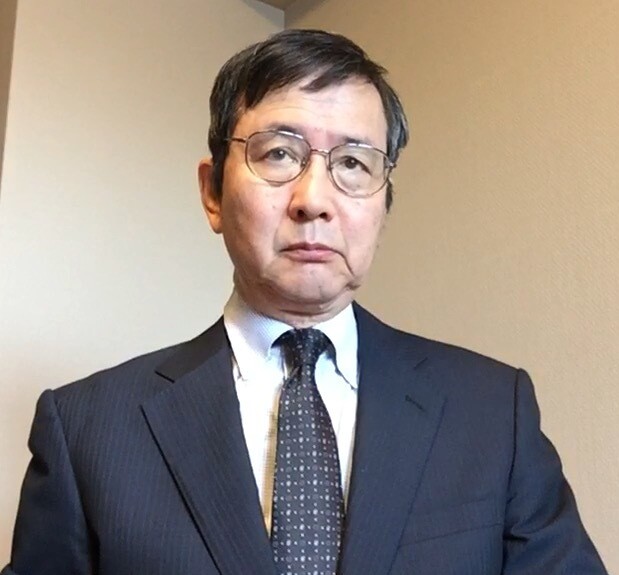hankyoreh
Links to other country sites 다른 나라 사이트 링크
[Interview] Japanese Supreme Court’s arguments at odds with international standards

Since South Korea’s Supreme Court ordered Japanese companies to pay damages to Korean victims of forced labor under Japan’s colonial occupation, the Japanese government and press have been arguing that South Korea is violating international law. But Japanese attorney Seita Yamamoto, who has been litigating postwar compensation cases for more than thirty years, said in an email interview with the Hankyoreh on Nov. 7 that it’s the Japanese arguments that are at odds with international standards.
In the 1990s, Yamamoto represented the plaintiffs in a damages lawsuit filed by the former comfort women in Japan and in a lawsuit concerning the Ukishima Maru, a ship that mysteriously sunk while carrying around 7,000 Korean forced laborers home on Aug. 22, just one week after Japan’s defeat in World War II and Korea’s liberation.
Yamamoto asserts that there’s a logical problem with the argument advanced by Japan that its 1965 agreement with South Korea prevents people with legitimate grievances from making claims in court.
In 2007, the Supreme Court of Japan rejected a damages lawsuit filed against Nishimatsu Construction by Chinese who had been taken to Japan for forced labor. While the court acknowledged that the plaintiffs had endured extreme physical and mental pain, it said their right to make claims, though still technically valid, had legally expired because of the Japan-China Joint Communiqué, in which the Chinese government gave up its claims to wartime compensation from Japan. This same argument from the Supreme Court of Japan has also been adopted in lawsuits filed subsequently in Japan by Korean victims of compulsory mobilization.
“The ruling by the Supreme Court of Japan runs contrary to international standards,” Yamamoto said.
Japanese government’s frame to absolve itself of legal responsibility to its own citizens
Yamamoto explains that the Japanese government’s argument was pioneered during the process of dealing with the aftermath of the war. In the Treaty of San Francisco that was reached with the Allies in 1952, Japan abandoned its right to make claims resulting from the war. When victims of the atomic attacks filed lawsuits in Japan, Japan argued that individuals still had the right to make claims but had lost their right to diplomatic protection.
In other words, the Japanese government could not take action to claim damages on behalf of Japanese citizens from the US or other Allied countries, but individuals who had suffered damage could still receive compensation by personally filing lawsuits in those countries. This argument was framed to absolve the Japanese government of the legal responsibility for its own citizens.
“The Japanese government has told experts that its agreement with South Korea only represents the abandonment of the right to diplomatic protection and then turned around and told the press and the general public that this agreement settled the matter completely. [Its recent actions] are also in line with that tendency, but this time they’re particularly inflammatory,” Yamamoto said.
Yamamoto said the Japanese government’s argument is unlikely to be convincing in international venues such as the International Criminal Court. “The International Covenant on Economic, Social and Cultural Rights, of which both South Korea and Japan are members, guarantees the right to a trial. That’s completely denied by the opinion of the Supreme Court of Japan that gives victims rights but doesn’t allow them to make claims,” Yamamoto said.
“To be sure, international trials are affected by political dynamics, and so we can’t say with certainty that Japan would lose,” Yamamoto added.
Yamamoto said he was making his personal website public “to share with researchers and ordinary people the materials accumulated during the litigation of postwar compensation during the past thirty years since being accredited as an attorney.”
After the South Korean Supreme Court’s ruling, Yamamoto expressed in a post on his website his “heartfelt respect for the plaintiffs who have filed lawsuits over the past twenty years.”
By Cho Ki-weon, Tokyo correspondent
Please direct comments or questions to [english@hani.co.kr]

Editorial・opinion
![[Column] Tariffs on China: Trump was dumb, Biden dumber [Column] Tariffs on China: Trump was dumb, Biden dumber](https://flexible.img.hani.co.kr/flexible/normal/500/300/imgdb/original/2024/0520/191716191153918.jpg) [Column] Tariffs on China: Trump was dumb, Biden dumber
[Column] Tariffs on China: Trump was dumb, Biden dumber![[Column] What if Seoul took reunification by force off the table? [Column] What if Seoul took reunification by force off the table?](https://flexible.img.hani.co.kr/flexible/normal/500/300/imgdb/original/2024/0520/3017161928630494.jpg) [Column] What if Seoul took reunification by force off the table?
[Column] What if Seoul took reunification by force off the table?- [Editorial] Intensifying US-China rivalry means Seoul must address uncertainty with Beijing sooner than later
- [Column] When ‘fairness’ means hate and violence
- [Editorial] Yoon must stop abusing authority to shield himself from investigation
- [Column] US troop withdrawal from Korea could be the Acheson Line all over
- [Column] How to win back readers who’ve turned to YouTube for news
- [Column] Welcome to the president’s pity party
- [Editorial] Korea must respond firmly to Japan’s attempt to usurp Line
- [Editorial] Transfers of prosecutors investigating Korea’s first lady send chilling message
Most viewed articles
- 1New doc undoes stereotypes of N. Korea with candid portraits of women’s football legends
- 2[Column] What if Seoul took reunification by force off the table?
- 3Is growing Korean investment in the US a win-win for both countries?
- 43 months into doctors strike, finding an emergency room in Korea is harder than ever
- 588% of Chinese firms would rather work with Korean partners than Japanese ones, survey finds
- 6Kim Jong-un wanted to meet with residents of shelled Yeonpyeong Island in South, Moon recalls in mem
- 7Unification minister says trusting intent of N. Korea could lead to ‘miscalculation,’ criticizing Mo
- 8To weigh costs and benefits, Korea must stop treating US troop presence as a sacred cow
- 9[Column] Tariffs on China: Trump was dumb, Biden dumber
- 10Video evidence surfaces showing Korean comfort women were massacred by Japanese military